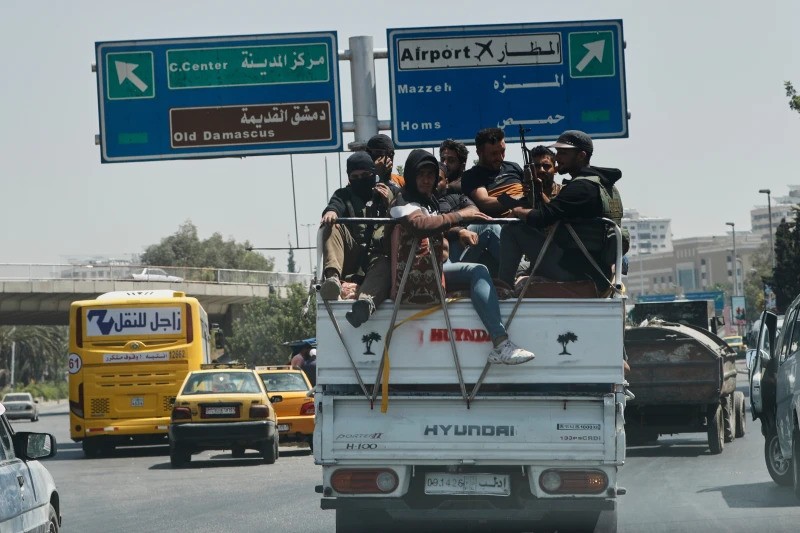Syria’s interim President Ahmad al-Sharaa on Saturday called on Sunni Muslim Bedouin tribes to fully commit to a ceasefire following days of violent clashes with Druze militias in the southern province of Sweida. The fighting has left hundreds dead and threatens the country’s fragile postwar transition.
Despite the appeal, fighting continued over the weekend. Syrian government forces, initially deployed to restore order but seen siding with Bedouin fighters, were redeployed to contain renewed violence that resumed Thursday. The unrest prompted Israeli airstrikes on Syrian military targets, including the Defense Ministry in Damascus. Israel said the strikes were in support of the Druze community, which has a significant presence in Israel and is viewed as a loyal minority group.
In his second public address since the clashes began, al-Sharaa accused armed groups from Sweida of reigniting hostilities through retaliatory attacks and blamed Israeli intervention for escalating the crisis.
The United States announced Saturday that Israel and Syria had agreed to a ceasefire, with American and Arab mediation playing a role in brokering the truce. Al-Sharaa did not directly acknowledge the agreement but thanked the US, Arab states, and Turkey for supporting efforts to stabilize the situation.
Al-Sharaa also warned the Bedouin that they “cannot replace the role of the state in handling the country’s affairs,” while thanking them for what he described as their “heroic stances.” He urged them to adhere to the ceasefire and comply with government directives.
A separate agreement sponsored by regional guarantors, and supported by prominent Druze leader Sheikh Hikmat al-Hijri, includes measures to de-escalate tensions in Sweida. These include the establishment of checkpoints outside the province, a 48-hour travel ban into border villages, and safe passage for remaining Bedouins to exit the area.
Al-Sharaa stressed that Sweida remains an “integral part of the Syrian state,” and called the Druze “a fundamental pillar” of Syria’s national identity. He reiterated his pledge to protect all minorities.
More than half of the world’s estimated 1 million Druze live in Syria. The rest are largely based in Lebanon and Israel, including in the occupied Golan Heights.
The UN reports that over 87,000 people have been displaced from Sweida since July 12 due to shelling, sniper attacks, and abductions. Many fled on foot and are now living in overcrowded schools and public buildings under severe conditions. Basic services like electricity, water, and telecommunications have been disrupted, and Sweida’s main hospital is operating at just 15% capacity due to fuel and staff shortages.
The White Helmets reported that one of their emergency leaders went missing on July 16 while responding to a UN request, highlighting the growing risks for aid workers.
Jordan, Syria, and the US agreed on practical steps to support the truce, including redeployment of Syrian security forces and the release of detainees from all parties, according to Jordan’s Foreign Ministry. Syria’s Minister of Information Hamza al-Mostafa said the ceasefire’s first phase will last 48 hours, focusing on halting clashes and restoring a security presence. Future stages will open humanitarian crossings and gradually reinstate state institutions.
Al-Mostafa acknowledged violations by some government security forces in Sweida but dismissed claims that the violence was part of a deliberate campaign. He accused Sheikh al-Hijri and his followers of rejecting reconciliation efforts and acting with Israeli support.
He also denied reports of direct peace talks between Syria and Israel. Discussions, he said, are limited to issues surrounding Israeli withdrawal from territory captured since December 8 and adherence to the 1974 disengagement agreement.
While officials urged calm, unrest has reached the capital. On Friday, a peaceful protest outside Syria’s parliament was attacked by unidentified men. The demonstrators were beaten, and their banners torn apart. The protest, sparked by the events in Sweida, began Thursday with three individuals, including filmmaker Zein Khuzam, and grew in size the next day.
Khuzam described the attack as a painful reminder of the early stages of Syria’s civil war. “At that moment, it felt like history was repeating itself,” she said. “It is very, very sad.”


